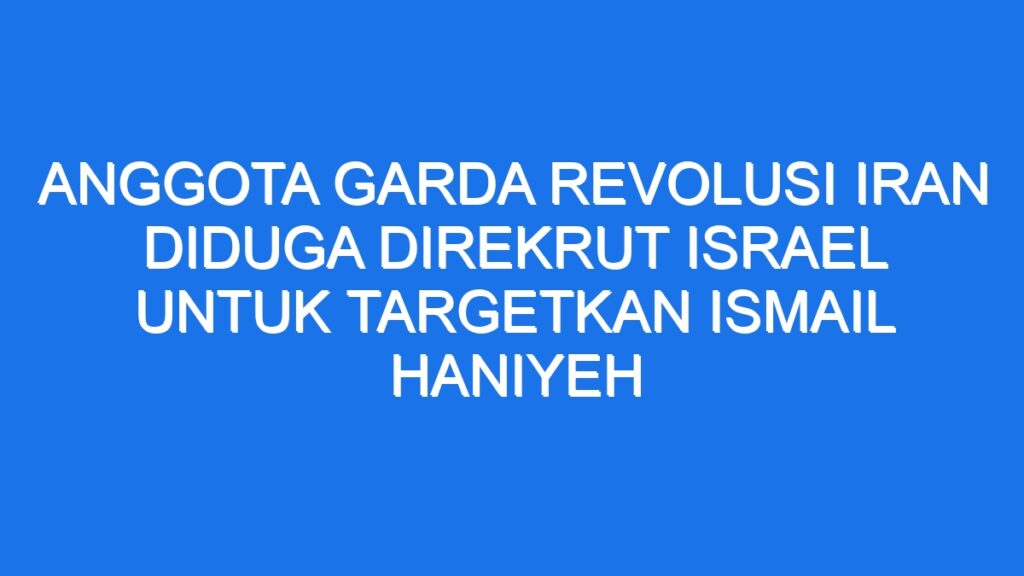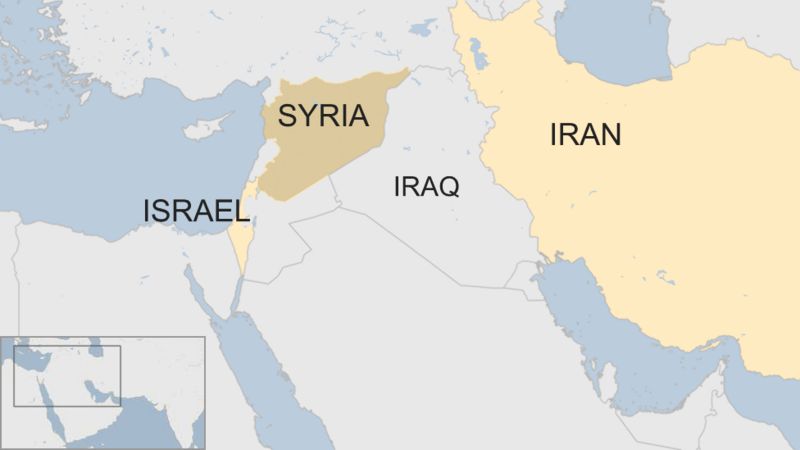Current Events and Tensions: Israel Iran News

The relationship between Israel and Iran has been marked by decades of animosity, punctuated by periods of escalating tensions and diplomatic efforts. Recent years have witnessed a renewed surge in tensions, fueled by a complex interplay of factors including Iran’s nuclear program, regional influence, and support for militant groups.
Recent Events and Tensions
The past few years have seen a significant increase in tensions between Israel and Iran. Here’s a timeline of key events:
- 2018: The United States withdrew from the Joint Comprehensive Plan of Action (JCPOA), the nuclear deal signed between Iran and world powers in 2015. This move was met with condemnation by Iran and its allies, and led to increased economic sanctions against Iran.
- 2019: Israel carried out a series of airstrikes against Iranian targets in Syria, claiming that these strikes were aimed at preventing Iran from establishing a permanent military presence in the country. Iran retaliated with missile attacks on Israeli military positions in the Golan Heights.
- 2020: Israel accused Iran of being behind a series of attacks on Israeli ships in the Gulf of Oman. Iran denied any involvement in the attacks.
- 2021: The United States and Iran engaged in indirect talks in Vienna aimed at reviving the JCPOA. The talks have been slow and difficult, with both sides remaining deeply divided on key issues.
- 2022: Israel carried out a series of airstrikes against Iranian targets in Syria, including a strike on a military base near Damascus. Iran retaliated with missile attacks on Israeli positions in the Golan Heights.
Key Issues
Several key issues contribute to the ongoing tensions between Israel and Iran:
- Iran’s Nuclear Program: Israel views Iran’s nuclear program as an existential threat and has repeatedly threatened military action if necessary to prevent Iran from developing nuclear weapons. Iran insists that its nuclear program is for peaceful purposes only.
- Regional Influence: Iran has sought to expand its influence in the Middle East, supporting militant groups such as Hezbollah in Lebanon and Hamas in Gaza. Israel sees Iran’s regional ambitions as a direct threat to its security.
- Support for Militant Groups: Israel accuses Iran of providing financial and military support to militant groups that carry out attacks against Israel. Iran denies these accusations, but its support for groups like Hezbollah and Hamas is well-documented.
Potential for Escalation or De-escalation
The potential for escalation or de-escalation in the Israel-Iran relationship depends on a complex interplay of factors, including:
- International Pressure: International pressure, particularly from the United States and its allies, could help to de-escalate tensions. However, the United States’ withdrawal from the JCPOA and its subsequent imposition of sanctions on Iran have made it more difficult to find common ground.
- Domestic Politics: Domestic politics in both Israel and Iran can influence the relationship. In Israel, a hawkish government is more likely to take a hard line against Iran. In Iran, a hardline government is more likely to support militant groups and pursue a more assertive foreign policy.
- Regional Dynamics: The regional dynamics in the Middle East can also play a role in the Israel-Iran relationship. The rise of extremist groups such as ISIS and the ongoing conflict in Syria have created a more volatile and unpredictable environment.
Historical Background and Context

The Israel-Iran conflict has deep historical roots, spanning decades and rooted in complex geopolitical and ideological factors. The 1979 Islamic Revolution in Iran marked a significant turning point in the relationship between the two nations, shaping the course of the conflict for years to come.
The Impact of the 1979 Islamic Revolution
The 1979 Islamic Revolution in Iran had a profound impact on the relationship between Iran and Israel. Prior to the revolution, Iran was a close ally of the United States and Israel, with a secular government that maintained friendly relations with both countries. However, the revolution led to the establishment of an Islamic Republic, which espoused an anti-Western and anti-Israel ideology. The new Iranian government, led by Ayatollah Ruhollah Khomeini, declared Israel an illegitimate state and a “cancerous tumor” that must be eradicated. This declaration signaled a radical shift in Iran’s foreign policy, which had previously been characterized by a more pragmatic approach to the Middle East. The revolution also led to a significant increase in Iranian support for Palestinian militant groups, further escalating tensions with Israel.
Regional and International Implications

The Israel-Iran conflict extends far beyond the two nations, impacting regional stability and global security. The tensions between these countries have created a complex web of alliances and rivalries, influencing the political landscape of the Middle East and beyond.
Impact on Regional Stability and Security
The Israel-Iran conflict has significantly impacted the stability and security of the Middle East, particularly in countries like Lebanon, Syria, and Iraq.
- Lebanon: Hezbollah, a Lebanese Shia political party and militant group, is closely aligned with Iran. The group’s presence in Lebanon, along with its extensive arsenal of missiles, poses a significant threat to Israel. The conflict between Israel and Iran has exacerbated tensions in Lebanon, leading to several military confrontations and political instability.
- Syria: Iran has been a major supporter of the Syrian government during the Syrian Civil War. The conflict has provided Iran with a platform to expand its influence in Syria, establishing military bases and deploying troops. Israel has carried out airstrikes against Iranian targets in Syria, further escalating tensions in the region.
- Iraq: Iran has a significant influence in Iraq, particularly among Shia communities. The presence of Iranian-backed militias in Iraq has contributed to instability and sectarian violence. Israel has also been accused of carrying out airstrikes against Iranian targets in Iraq, further complicating the security situation.
Role of International Actors, Israel iran news
The Israel-Iran conflict has attracted the attention of international actors, including the United States, Russia, and the European Union. These actors have played varying roles in shaping the dynamics of the conflict.
- United States: The United States has been a staunch ally of Israel, providing significant military and economic support. The US has also imposed sanctions on Iran, aiming to curb its nuclear program and regional influence. The US withdrawal from the Joint Comprehensive Plan of Action (JCPOA), a nuclear deal between Iran and world powers, further escalated tensions between the US and Iran, indirectly impacting the Israel-Iran conflict.
- Russia: Russia has maintained close ties with both Iran and Syria. Russia’s military intervention in Syria has provided a platform for Iran to expand its influence in the region. Russia has also been a key player in negotiations regarding Iran’s nuclear program.
- European Union: The European Union has sought to maintain a balanced approach towards the Israel-Iran conflict. The EU has expressed concerns about Iran’s nuclear program and its support for militant groups. However, the EU has also called for dialogue and diplomacy to resolve the conflict.
Implications for Global Security
The Israel-Iran conflict has implications for global security, particularly in relation to nuclear proliferation and terrorism.
- Nuclear Proliferation: Iran’s nuclear program has been a major source of concern for the international community. The potential for Iran to develop nuclear weapons poses a significant threat to regional and global security. The Israel-Iran conflict has added to the tensions surrounding Iran’s nuclear ambitions, raising the risk of a nuclear arms race in the Middle East.
- Terrorism: Iran has been accused of supporting terrorist groups, including Hezbollah and Hamas. The conflict between Israel and Iran has provided a breeding ground for terrorist activities, increasing the risk of attacks against both Israeli and Western interests.
Israel iran news – The ongoing tensions between Israel and Iran continue to dominate headlines, raising concerns about potential regional instability. However, amidst these geopolitical complexities, the domestic concerns of many Americans are focused on economic matters, particularly the 2025 social security cola increase.
This anticipated adjustment, though seemingly unrelated to international affairs, can significantly impact the lives of millions of Americans, especially those relying on social security benefits. The uncertainty surrounding the magnitude of this increase adds another layer of complexity to the already volatile geopolitical landscape.
The ongoing tensions between Israel and Iran have been a constant source of international concern. While the world watches this complex geopolitical dance, it’s easy to forget about the everyday issues that affect us all, like the environmental impact of our choices.
For instance, consider the humble McDonald’s cups we use for our meals. These seemingly insignificant items contribute to a larger problem, reminding us that even in the midst of global conflict, individual actions can have a collective impact on our planet.
As we grapple with the complexities of international relations, it’s crucial to remember the interconnectedness of our world and the need for sustainable practices.
